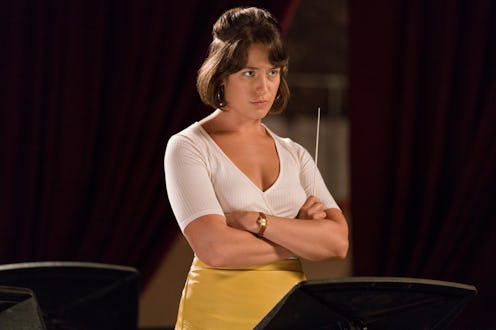Entertainment
‘Mozart In The Jungle’ Shows That The Classical Music World Isn’t Immune To Gender Inequality

When audiences meet Lola Kirke's Mozart In The Jungle character Hailey Rutledge, she's an artist in that transitionary period between childhood prodigy and adult success. An oboist, Hailey may not have the skills to become one of the all-time greats, but she's mentored and championed by superstar conductor Rodrigo De Souza (Gael Garcia Bernal) because she has a fire that he can't help but believe in. (She "plays with the blood," in MITJ parlance.) In Season 4 of Mozart In The Jungle, Hailey applies that fire to another musical pursuit. And in showing her journey, the Amazon series highlights the dismal proportion of female conductors in classical music in addition to the lack of sufficiently celebrated women composers.
According to The New York Times, in 2016, only one of the 24 major orchestras in the United States was being conducted by a woman — Marin Alsop of the Baltimore Symphony Orchestra. (She still retains that position.) Later that same year, the Times ran an article aligned with the Metropolitan Opera's once-in-a-century decision to produce an opera written by a woman that attempted to unearth other hidden gems written by female composers. It's a piece that Kirke references as she half-reclines on a couch next to her co-star Bernal in a sunny New York City hotel room on an afternoon in February.
"I think it’s really important for the show to address [the gender imbalance] because there’s a scarcity of women composers that goes back through the ages," she says, linking the gender imbalance in composing to conducting's overwhelmingly male population.
"These pieces are written by men to be communicated to an orchestra by a man as well," she explains. "Mozart never intended for a woman to conduct that piece of music, just because it was unheard of. And I wondered if, in a way, that would be like a female actor playing a role like Hamlet or something like that."
Kirke references the unique physicality of conducting and how the movement quality "can just be a little awkward at first" for women. (Hailey shines brightest at the podium when she fully lets go.) The Times quotes Alsop leading a master class for women conductors and offering a note about a soft movement that stemmed from a frustrating double standard: “All these gestures we make — if a man did that, he’s sensitive, but if we do that, we’re girlie. You have to be aware of every move that you make, because it sends a signal.” To succeed as one of these rare world-class woman conductors, it's necessary to be extremely conscious of perception and stereotypes.
The inequity in this area surprised Bernal. "I don’t feel the difference, I don’t see the difference, between man and woman in such ways," he says. "Lately you discover, oh my god, yeah. There is a power structure in the classical music world that definitely has shaped everything so that men are much more prominent." He mentions that Mozart's sister Marianne was often his collaborator, though Kirke is quick to point out that her work — as opposed to her brother's — was "buried." There's a healthy back and forth between the two actors as they discuss the degree to which gender impacts the world their show depicts. "Are we breaking up?" Kirke laughs at one point.
In Season 4, Hailey continues her break from the oboe and dedicates herself fully to conducting, focusing particularly on work by women. But the international conducting competition that she enters into is as mainstream as her ensemble is niche. She has to distinguish herself not just as a newcomer but as a woman and the girlfriend of the famed Rodrigo. In one scene, it's suggested that a certain judge is choosing finalists based on his desire to only have one woman in that group.
Perhaps there's reason to hope that Mozart In The Jungle can inspire more women to take up the baton and therefore turn the tide. Keith Cerny, the General Director of the Dallas Opera, told PBS News Hour that he thinks that the inequality is self-perpetuating. "I think it’s an issue where, because there’s fewer women in those positions, search committees and general directors and symphony CEOs don’t tend to think so much about hiring women for those opportunities," he said. The Dallas Opera is home to the Hart Institute for Women Conductors, one of a few intensives dedicated to evening out the numbers.
Coupled with the gender discrimination she faces, Hailey is very conscious of being inside Rodrigo's "orbit" and how their relationship affects how other people see her. Sometimes she banishes him from her work, because no matter what the reality of the situation is, people will perceive her as being the pet project of a powerful man. There's a bit of a disconnect there, as Rodrigo struggles to understand what the big deal is — and, as Bernal says, "gets excited about the radical concept of being a boyfriend." He's a free spirit, yes, but he also has a completely different experience to Hailey because of his gender.
"I think that is a male privilege — to not worry that something will affect your career that has nothing to do with your talent," Kirke says.
Unfortunately, Hailey is very, very aware of the challenges she faces. But it's to Mozart In The Jungle's credit that the show is, too.